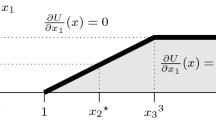Abstract
A multicriteria optimization problem is one of choosing an alternative that optimizes several—possibly conflicting—objective functions simultaneously. The utopia point of a multicriteria optimization problem is the vector that specifies for each objective function the most favorable feasible value. The Euclidean compromise solution in multicriteria optimization is a solution that selects from a feasible set the alternative such that its vector of criteria values has minimal Euclidean distance to the utopia point. This paper provides several axiomatic characterizations of the Euclidean compromise solution that are based on consistency properties.
Similar content being viewed by others
References
Bouyssou D, Perny P, Pirlot M, Vincke P (1993) A manifesto for the new MCDA era. J Multi-Criteria Decis Anal 2: 125–127
Chun Y (1988) The equal-loss principle for bargaining problems. Econ Lett 26: 103–106
Chun Y, Peters H (1991) The lexicographic equal-loss solution. Math Soc Sci 22: 151–161
Conley J, McLean R, Wilkie S (2008) Axiomatic foundations for compromise theory: the duality of bargaining theory and multi-objective programming, Mimeo
Freimer M, Yu PL (1976) Some new results on compromise solutions for group decision problems. Manag Sci 22: 688–693
Gearhart WB (1979) Compromise solutions and estimation of the noninferior set. J Optim Theory Appl 28: 29–47
Kalai E (1977) Proportional solutions to bargaining situations: interpersonal utility comparisons. Econometrica 45: 1623–1630
Kalai E, Smorodinsky M (1975) Other solutions to Nash’s bargaining problem. Econometrica 43: 513–518
Larichev OI, Moshkovich HM (1997) Verbal decision analysis for unstructured problems. Kluwer Academic Publishers, Boston, Dordrecht, London
Lensberg T (1988) Stability and the Nash solution. J Econ Theory 45: 330–341
Lensberg T, Thomson W (1988) Characterizing the Nash bargaining solution without Pareto optimality. Soc Choice Welf 5: 247–259
Luenberger DG (1969) Optimization by vector space methods. Wiley Interscience, New York
Nash JF (1950) The bargaining problem. Econometrica 18: 155–162
Pfingsten A, Wagener A (2003) Bargaining solutions as social compromises. Theory Decis 55: 359–389
Roth AE (1977) Individual rationality and Nash’s solution to the bargaining problem. Math Oper Res 2: 64– 65
Roth AE (1985) Game-theoretic models of bargaining. Cambridge University Press, Cambridge
Rubinstein A, Zhou L (1999) Choice problems with a ‘reference’ point. Math Soc Sci 17: 205–209
Sawaragi YH, Nakayama , Tanino T (1985) Theory of multiobjective optimization. Academic Press, New York
Steuer RE, Gardiner LR, Gray J (1996) A bibliographic survey of the activities and international nature of multiple criteria decision making. J Multi-Criteria Decis Anal 5: 195–217
Thomson W (2006) Consistent allocation rules, unpublished manuscript
White DJ (1982) Optimality and efficiency. John Wiley and Sons, New York
White DJ (1984) Multiple objective programming and penalty functions. J Optim Theory Appl 43: 583–599
Yu PL (1973) A class of solutions for group decision problems. Manag Sci 19: 936–946
Yu PL (1985) Multiple-criteria decision making: concepts, techniques, and extensions. Plenum Publishing Corporation, New York
Zeleny M (1976) The theory of the displaced ideal. In: Zeleny M (eds) Multi-criteria decision making. Springer, Berlin
Zeleny M (1982) Multiple criteria decision making. McGraw-Hill, New York
Author information
Authors and Affiliations
Corresponding author
Rights and permissions
About this article
Cite this article
Voorneveld, M., van den Nouweland, A. & McLean, R. Axiomatizations of the Euclidean compromise solution. Int J Game Theory 40, 427–448 (2011). https://doi.org/10.1007/s00182-010-0240-z
Accepted:
Published:
Issue Date:
DOI: https://doi.org/10.1007/s00182-010-0240-z



